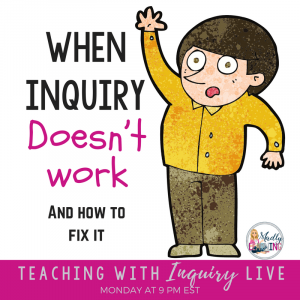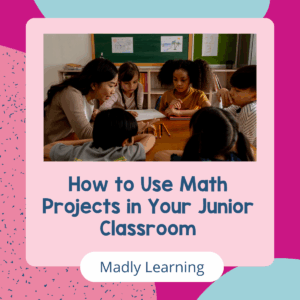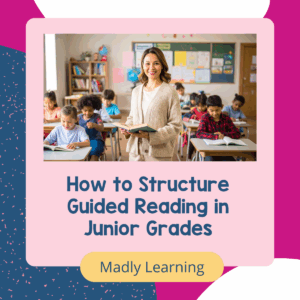 So sometimes inquiry doesn’t work!
So sometimes inquiry doesn’t work!
In fact in the research by John Hattie, inquiry based learning and project based learning fall below the line. The rate in which something is deemed to have an average effect on student achievement.
Well that’s not good news….
But then you hear Hattie explaining why this might be it makes more sense. Watch Hattie explain this here.
Now I will acknowledge that Hattie’s critics state that his meta analysis of research is based on research dating back to the 1960’s which indeed could be problematic if applied to today’s classrooms. You can read more here and here
So what do we do with this?…..Well the way I see it.
- Hattie’s scale of effectiveness ranks inquiry based teaching just below the average score of 0.4. This still means there is a positive effect
- Inquiry is an umbrella term that involves many important teaching practices that rank much higher on Hattie’s list including:
-
- Piagetian Programs (using developmentally appropriate reasoning and higher order thinking skills. This means no complex analysis for junior students)
- micro teaching
- classroom discussions
- reciprocal teaching
- feedback
- self questioning
- problem solving teaching
- As Hattie states in the video above inquiry is better for deeper level learning and surface level learning
- There are three phases of inquiry
-
- beginning – engaging learning
- middle – learning knowledge and understanding
- end – digging deeper application and communication
so if you have seen failure with inquiry there might be some clues why
Is it developmentally appropriate?
Are we asking our students to develop these deep questions before they have the context to dig deeper.
If you are in construction before you dig a hole you learn about the soil conditions and the environment you set up your equipment then you dig deeper.
Inquiry based learning is the same way. They start with curiosity and questions but they may not be able to answer these questions right away and some of those questions might not be that great deep questions that is okay.
These questions at the beginning give you an insight into your students interests, ideas, misconceptions, gaps, etc. They are a goal and an opportunity to assess what they know and where you can go with it.
Have we set the stage?
Before they start digging deeper to find the answers to their questions independently they need to first learn more about the content.
No this does not mean that we move away from a student centered approach and begin to have our students passively acquire knowledge but that we use their surface knowledge and understand questions to help us guide them in gaining a better understanding of the content.
We use a guided inquiry approach. To help them lay the foundation to dig a bit deeper.
Are we integrating it with other best practices?
Using questions as your guide for inquiry and letting students discover things all on their own without guidance isn’t going to work either
When students find information we need to help them make sense of it. We need to walk them through the thinking that is needed that allows them to integrate new knowledge with previous understandings.
We need to have opportunities to
- make meaningful connections
- Share our learning ask more questions
- make it all make sense
- get feedback
- reflect
- collaborate with others
Inquiry is not about students doing it on their own but it is about building a learning community where we all have a voice and learn along side one another.
Have we picked the right content to inquire about?
Well sometimes our hands are tied but we need to make sure we are not asking our students to do more than they are capable
We need to get our students prepare to inquire about the bigger issues. The real life issues that affect people.
We also need to make sure inquiry projects are about applying what they learned and making connections and communicating their results.
Our inquiry projects are less effective when we are asking them to just regurgitate facts.
Are we doing “inquiry” too soon?
so most of the time we use inquiry to mean the student defined question that is being researched and answered. That we start with this big idea then let them have at it. Just start researching away.
This level of autonomy is too soon for most 10 year olds.
Plus in the context of learning new unfamiliar content they can’t dig deep into learning before they learn a bit about the subject.
There is an important middle step that needs to be put into place before students can answer those big ideas.
So what can you do about it? How can you fix it?
Well here in this freebie I have outlined my three phases for inquiry.
Inquiry has a beginning, middle, and end.
Beginning: Inspiring Curiosity
This is where you gather information, ask questions, encourage students to be curious. They ask questions, tell you what they know and you set the stage with clearly defined learning goals and success criteria.
Middle: Building the foundation
This is where we need to look at those surface level ideas and plan opportunities for students to build their background knowledge.
We can set them up with questions, lead them in the direction of quality research and engage them with meaningful experiences.
We talk and conference and help them make meaning of the new learning they are discovering.
Classroom discussions, reflections, conferences, and small group instruction, even direct teaching when necessary is all important here.
This can even be a place for assessment
The End: Digging deeper
This is the part that everyone thinks about.
Chasing the big idea, digging deeper.
This part is much easier when the background knowledge is there.
They choose an area of interest they ask a big question, they find some answers
- They start with the question
- Look for some answers through research
- Summarize and analyze
- Make a plan or a solution
- communicate their results.


